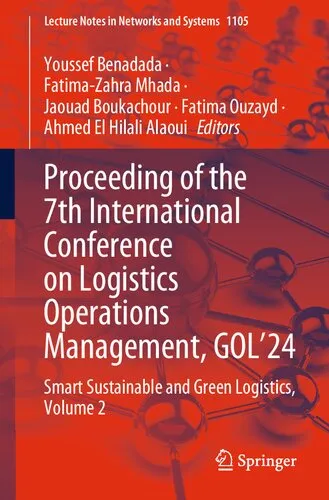Proceeding of the 7th International Conference on Logistics Operations Management, GOL'24: Smart Sustainable and Green Logistics, Volume 2
4.6
Reviews from our users

You Can Ask your questions from this book's AI after Login
Each download or ask from book AI costs 2 points. To earn more free points, please visit the Points Guide Page and complete some valuable actions.Introduction to the Book
The "Proceeding of the 7th International Conference on Logistics Operations Management, GOL'24: Smart Sustainable and Green Logistics, Volume 2" is the latest installment in a series of academic and professional publications that tackle the modern challenges, advancements, and innovations in logistics operations. This comprehensive volume compiles insights from researchers, practitioners, and thought leaders, all of whom shared their expertise during the GOL'24 conference. By placing a particular emphasis on sustainability and smart systems, this book addresses pressing topics in logistics with an eye towards green solutions for the planet.
GOL'24 serves as a platform for the exploration of cutting-edge ideas and techniques, focusing on the integration of technologies like Artificial Intelligence (AI), the Internet of Things (IoT), and Machine Learning (ML) within the domain of logistics operations. Volume 2 of the proceedings narrows its focus on the actionable frameworks and strategies designed to enhance sustainability while ensuring efficiency and reducing environmental impact. This book is a treasure trove for academicians, logistics professionals, policymakers, and anyone passionate about transforming supply chains to meet the sustainable demands of the 21st century.
Detailed Summary of the Book
Across its pages, this volume delves into the concept of "Smart Sustainable and Green Logistics," exploring how logistics operations can evolve to address both the needs of businesses and the sustainability goals of nations. Through rigorous case studies, practical analyses, and theoretical discussions, this book unearths methodologies aimed at reducing carbon footprints, improving energy efficiency, and integrating renewable resources in logistics operations.
One key area of focus is the role of digitalization in logistics, with chapters discussing how data-driven solutions can streamline operations, minimize waste, and promote transparency across supply chains. Another paramount topic covered is urban logistics and last-mile delivery problems, where innovative solutions are proposed to tackle the growing complexities of city supply chains in an environmentally conscious way.
Among the most exciting aspects of this book are the sections dedicated to collaborative models in logistics, where stakeholders across different industries come together to share resources, mitigate emissions, and work towards common sustainability goals. The integration of smart technology, like real-time monitoring systems and automated systems, is also elaborately explored to shed light on practical applications and future trends.
Key Takeaways
- The logistics industry has significant potential to reduce global emissions with the adoption of green innovations.
- Artificial Intelligence and IoT are game changers for improving decision-making in logistics operations.
- Collaborative approaches are vital to achieving large-scale sustainability goals in global supply chains.
- Last-mile delivery solutions are critical for minimizing environmental impacts in urban areas.
- Digital transformation is no longer an option but a necessity for sustainable logistics operations.
Famous Quotes from the Book
"The future of logistics lies at the crossroads of technology and sustainability. To innovate is to survive; to sustain is to thrive."
"Green logistics is no longer an ambition—it’s a responsibility that every stakeholder must embrace."
"In the age of digitalization, the data we collect does not just forecast trends—it inspires solutions."
Why This Book Matters
This book is a critical resource for anyone looking to stay at the forefront of logistics innovation while also contributing to global sustainability goals. It matters because it addresses the very real and present issues of climate change, urbanization, and resource constraint within the logistics sector. By focusing on tangible solutions and actionable steps, it empowers readers to make informed decisions and adopt best practices in their professional and academic endeavors.
Furthermore, the book’s emphasis on collaborative approaches bridges the gap between academia and industry, creating a rich dialogue that transcends traditional boundaries. With the rapid pace of technological advancements, this book provides a roadmap for navigating the complexities of integrating these technologies in a way that benefits both businesses and the environment. It’s an essential read for those committed to creating a smarter and greener future for global supply chains.
Free Direct Download
Get Free Access to Download this and other Thousands of Books (Join Now)
For read this book you need PDF Reader Software like Foxit Reader


